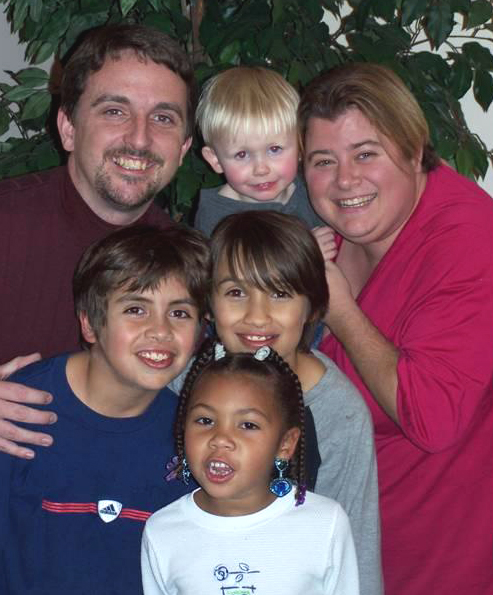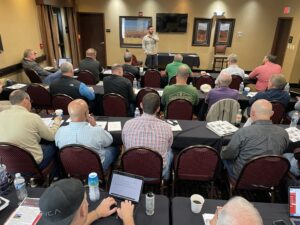
DRY BRANCH, Ga. (BP)–For a long time there have been two Stone Creek churches in Dry Branch, Ga., just east of Macon. Except for the Gospel they preach, surface appearances have them as different as black and white. Beginning on Mother’s Day last year it took a storm to bring them together.
That day a rash of 15 tornados cut across central and north Georgia beginning at 4 a.m. The one to hit Macon around 6 a.m. was classified as an EF2. One of the churches it hit was Stone Creek Baptist Church 1874, destroying the building.
Down the road members of Stone Creek Baptist Church 1808 were relieved the storm didn’t cause damage to their property, but they felt for their neighbors. Fifty-five years earlier, Stone Creek 1808 had been destroyed by tornado. A small child who lived next door died and is buried in the church’s cemetery.
The same name with a different year brings about the first question from strangers. The explanation is simple. Stone Creek Baptist Church was established in 1808. As stated in “A History of Stone Creek Baptist Church” by Billy Walker Jones, “Church custom dictated that each member’s slaves were to be added to the congregation. Galleries were installed around the ceiling of the auditorium for the ‘blacks.’ Sunday would find plantation owners, farmers, and their families in the lower pews and their slaves worshipping in partially enclosed balconies above.”
In 1874, black members of Stone Creek wanted to establish their own church. They did just that a quarter-mile down Riggins Mill Road. Aside from the occasional exchange of mail sent to the wrong place, the congregations would have little to do with one another over the next 134 years.
A BIT OF NAIVETE
In the summer of 2007 Rodney Peavy became pastor of Stone Creek 1808, a congregation with deep roots to which practically all Macon Baptist churches can trace their beginning. At 35, he and his wife Beverly, 30, were the typical young family that churches love to have. To top it off they had three sons, Christian, 9, Carlos, 8, and Joshua, 1, and a daughter, Tosha, 6.
The family is different, though. Rodney and Beverly are Caucasian, while biological brothers Christian and Carlos are biracial (Hispanic/Caucasian) as is Tosha (African American/Caucasian). Joshua, Tosha’s biological half-brother, is Caucasian. All became part of the Peavy home through foster adoption.
“What we have in common is much more important than our differences,” Peavy said at the end of 2008, a monumental year for his church as well as the one down the road. “We are all loved by the same God. I always knew this, but now it means more to me.”
The words could be applied to his own children and what they have taught him about race, but in this case, Peavy is referring to the recent thaw in relations he sees in this small community since that Mother’s Day storm.
Stone Creek 1874’s sanctuary had been destroyed. The church was in the process of completing a new sanctuary, but it wasn’t ready and had lost its steeple in the high winds. So the congregation needed a place to meet.
What happened next perhaps needed to come from someone with no perception of local history. Without church approval but with a little bit of naïveté, Peavy approached Stone Creek 1874 pastor Dexter Jordan and offered his church’s fellowship hall as a temporary meeting place.
The reporters on his church’s front steps the next Sunday were a clue as to the ripple effects caused.
Suddenly, the quarter-mile and 134-year divide had shrunk. Children of different colors shared the playground. Conversations began in the hallways. Both congregations had separate activities at the same location, but familiarity began to grow.
The relationship deepened Aug. 31 as both congregations came together to kick off a two-week celebration of Stone Creek’s 200th anniversary. Members from each church began walking from their respective parking lots, followed by press, and meeting in the middle. Singing “He’s Got the Whole World in His Hands,” they proceeded to the completed sanctuary of Stone Creek 1874 for worship. Together.
The next two weeks included suppers, games, Old Timey Day, communion, prayer meetings, youth night, and more eating, culminating Sept. 14 with homecoming at 1808, as the shorthand had become. Jordan and Peavy both spoke often during the various meetings.
ADOPTION’S INFLUENCE
“Some look at our family when we are out in public and see two Hispanic kids, one African American kid and one white kid with two white parents,” Peavy said. “When Bev and I look at them we see ‘our kids.’ I see pieces of myself and pieces of her and, of course, their individual personalities.”
Before marrying in 1997, Rodney and Beverly talked about adoption. After a couple of years with no children they began to proceed with foster parenting.
In November 2001 Christian and Carlos moved in. In April 2006 Tosha joined the family. Joshua arrived as an infant in January 2007.
Peavy said having multiple ethnicities in his home affected him. Concerns came in a flurry, but quickly faded into the background.
“I questioned myself some when Christian and Carlos joined us,” he admitted. “Will it matter they are a different race? Is it fair to them? Will family and friends accept them?
“It took us all of five seconds to say yes when [children’s services] called about us taking the boys. God took care of all my concerns.”
Stares would come when the family would go out. Rare was the time someone wouldn’t ask or comment.
“It used to bother me, but now I see it as an opportunity,” Peavy said. “We’ve had many chances to share our views on adoption and foster care and even witness as a result of our family makeup. We always emphasize that God built our family.”
Being a multiracial family played a large role in Peavy’s contacting Stone Creek 1874, he added. “My perspective on race relations has changed pretty significantly since we adopted our kids. After the storm I honestly didn’t factor in race. [Stone Creek 1874] needed help and we were in the best position to help them.
“I do, however, think my family testimony aided me in seeing it as I did. I saw things a little more objectively without worrying what others would think. I feel it gave me trust from both sides. Everyone was very gracious and willing to come together and we’ve been so blessed as a result.”
An observation from that first service at Stone Creek 1874 sticks with him. As Peavy spoke from the pulpit, an elderly African American lady turned to Tosha during the welcome time and made a simple, distinct statement.
“Honey, you remember this day. You are making history.”
As a special education teacher at East Laurens Elementary School in Dublin, Beverly Peavy has noticed the learning going on between both churches.
“It is amazing the walls that fell when the two churches began talking,” she said. “My kids found new friendships as the other kids from down the road joined us. They felt a sense of pride when their father was recognized at the Stone Creek 1874 worship service. We’ve talked about the differences in each church’s styles. They were engrossed by it all.”
“It was funny hearing people talk after that first service,” Rodney recalled. “They were saying things like ‘I work with that person’ and ‘They retired the same year I did from the chalk mine’ or ‘That lady was my nurse in the hospital.’
“We realized we had more in common than we thought. Those people weren’t just the African American church down the street. They are our friends and neighbors and co-workers.”
Since then it’s not uncommon for 1874 members to shout out a “Hey Pastor Peavy” when the 1808 pastor is running an errand. Members of 1808 have attended special services at 1874 since as well. The youth group is clamoring for another worship service with 1874.
Peavy credits God with the Stone Creek reunion, using his children for changes that began with him.
“God has used experiences related to my family to prepare me for something that honestly I probably wouldn’t have been able to handle correctly otherwise. I was in a unique place in my life to deal with a specific crisis. I feel He used my family to desensitize me to any possible complications and not worry about consequences.
“We went into adoption a little self-righteous about what we were going to do for these children. It ended up the other way. They’ve changed our lives so much.”
–30–
Scott Barkley is production editor of The Christian Index, newsjournal of the Georgia Baptist Convention.
















